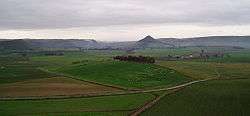Campidano

Campidano (Sardinian: Campidànu) is a plain located in the south-western area of Sardinia, Italy, covering approximately 100 kilometres between Cagliari and Oristano.
Geography
.jpg)
Geologically, it is a graben, a tectonic structure formed in the mid-Pliocene/early Pleistocene (4 to 2 millions years ago). Later it was subject to large sedimentary deposition phenomena, creating an overall thickness of 600 m of sediments.
The plain is crossed by the Tirso River, the longest in Sardinia.
History
Agriculture has been successful in Campidano since the Beaker people of the Neolithic, continuing on through the Phoenicians and the Romans, who cultivated here grains and grape. Dams of the large Sardinian rivers nourish the artichoke and wheat cultures, also typical products of this zone. Paddy fields are present near Oristano.
Anopheles mosquito was also introduced in Campidano by the Romans, and infested the area with malaria for two millennias until the 20th century reclamation. The present remaining marshes is home to a flourishing wildlife, including pink flamingo birds.
See also
References
Coordinates: 39°36′00″N 8°54′00″E / 39.6000°N 8.9000°E